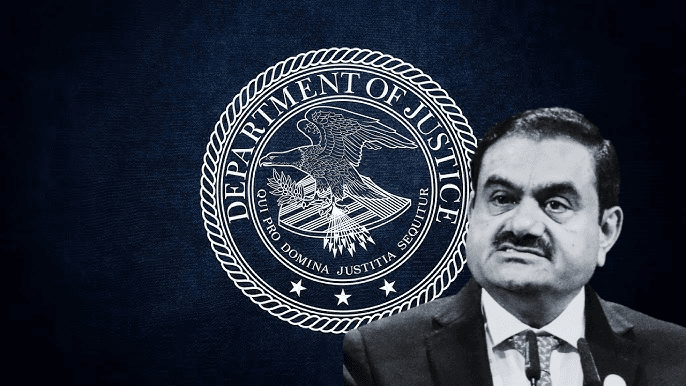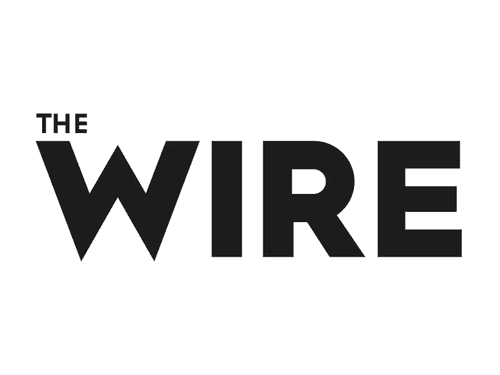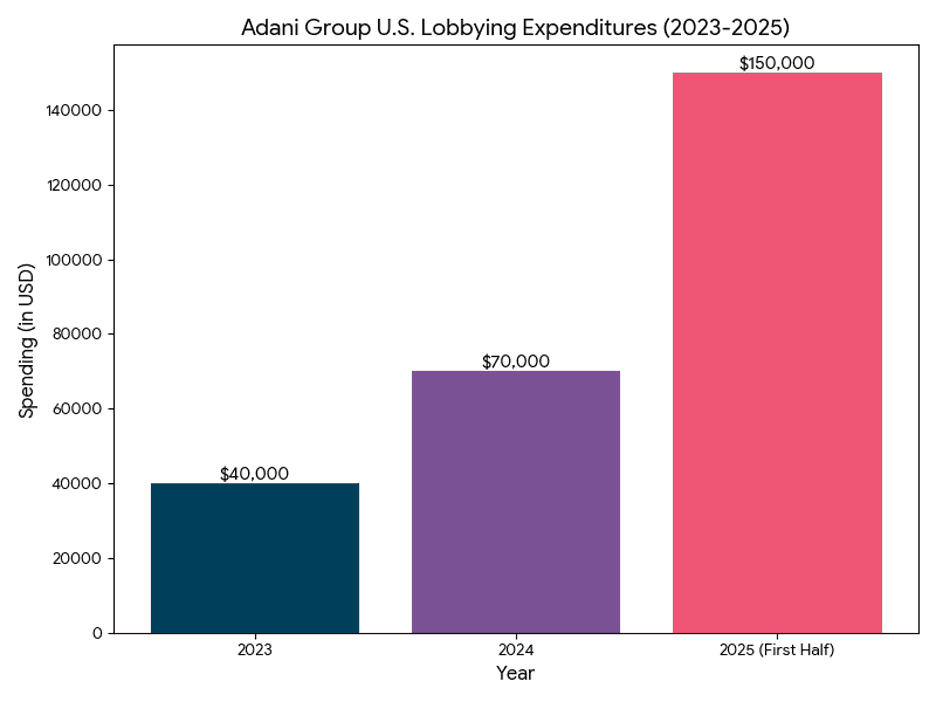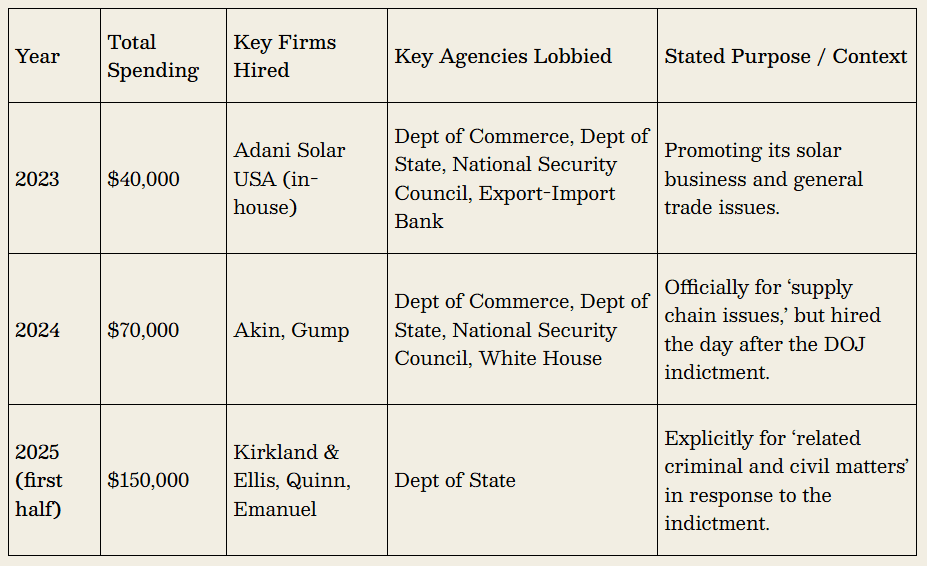On November 20, 2024, the US Department of Justice (DOJ) unsealed an indictment against the Adani Group, charging its chairman Gautam Adani, his nephew Sagar Adani and other senior executives with orchestrating a “massive bribery scheme” to win energy contracts in India. This event changed the dynamics of the Adani Group’s newly initiated lobbying efforts in the US. From a modest commercial lobbying exercise, it turned into a targeted lobbying effort with two of most renowned legal and lobbying firms brought on board for what appears to have been a crisis management campaign.
An analysis of federal lobbying disclosures from 2023 to 2025 reveals a distinct three-phase strategy, providing a timeline of Adani’s response to escalating US legal and regulatory pressure. This data has been made available by OpenSecrets, a US-based research group tracking money in US politics and its effect on elections and public policy.
The Adani Group has called the charges in the DOJ indictment “baseless” and denied them. The group said in a press statement on November 21 that it has always upheld and is steadfastly committed to “maintaining the highest standards of governance, transparency and regulatory compliance across all jurisdictions of its operations.”
Phase 1, 2023: The beginning, modest commercial lobbying
Throughout 2023, the Adani Group’s lobbying footprint in Washington D.C. was minimal and focused on business objectives.
The total lobbying expenditure for the year was only $40,000. This effort was run entirely in-house by its subsidiary, Adani Solar USA, with a single registered lobbyist, Anurag Varma.
The group’s stated aim was to engage with a range of government bodies, including the Department of Commerce, Department of State, Export-Import Bank of the US, National Security Council and the Overseas Private Investment Corporation. The focus, then, was on commercial interests related to the company’s solar business and general trade issues.
The main player managing this was Varma, who has extensive experience in lobbying in the US. He has been hired by Indian and Indian-American players – including the Indian government – wanting to advocate for their causes in Washington since the 1990s.
Phase 2, late 2024: The indictment and immediate reaction
The unsealing of the DOJ indictment in November 2024 triggered an immediate strategic shift in Adani’s approach to Washington.
In a rapid response to the indictment, the very next day, on November 21, 2024, Adani hired a major law and lobbying firm, Akin Gump Strauss Hauer & Feld. While the firm’s official registration cited lobbying on “Issues related to the supply chain”, the timing, immediately following the indictment, made it clear that it was likely a response to the legal crisis the company was facing.
With the hiring of Akin Gump Strauss Hauer & Feld, Adani’s lobbying team expanded to five individuals, four of whom were “revolving door” profiles, meaning people with extensive prior government insider experience. Notably, the team included former Member of Congress Ileana Ros-Lehtinen. The group’s total lobbying spending for 2024 nearly doubled, going up to $70,000, with an additional $20,000 paid to Akin Gump. Also, its list of lobbying targets grew to include the White House.
This marked an escalation from commercial advocacy to the quest for high-level political influence.
Phase 3, 2025: The crisis campaign involving high-profile law firms
The first half of 2025, according to the group’s filings, saw Adani’s crisis-response apparatus grow, with a massive surge in spending and the hiring of elite legal defence firms, Kirkland & Ellis LLP and Quinn Emanuel Urquhart & Sullivan, LLP.
Lobbying expenditures exploded to $150,000 in just the first six months of 2025, more than doubling the spending of the entire previous year. The number of lobbyists engaged went up to eight.
Source: Data made available by OpenSecrets
This hints towards a shift to legal defence. The focus of the lobbying effort moved directly to Adani Green Energy, the subsidiary at the heart of the bribery allegations. On January 20, 2025, Adani Green Energy retained two of the US’s most powerful law firms for white-collar defence: Kirkland & Ellis and Quinn Emanuel Urquhart & Sullivan. The registration forms for both firms were direct, stating they were hired to lobby on “Green energy issues and related criminal and civil matters.”
This explicitly connects their work to the DOJ case in the Eastern District of New York, and marks the final shift from commercial promotion to legal defence and high-level lobbying. The new lobbying team included top-tier legal talent such as William Burck, a former deputy counsel to the US president and now a lobbyist at Quinn Emanuel Urquhart & Sullivan.
The main target, with the new legal teams in place, is solely the Department of State. All the other government agencies it had said it was engaging with in previous years’ filings no longer found a place. Given the international nature of the bribery allegations and the involvement of foreign officials, the State Department is a critical agency for the company to engage with as it navigates its defence in the US criminal case.
Quinn Emanuel Urquhart & Sullivan’s and Kirkland’s lobbying, according to their filings, covers Energy/Nuclear, lobbying related to Law Enforcement/Courts/Judges/Crimes/Prisons and Civil Rights and Civil Liberties with the State Department for the Adani Group. The move from multi-agency efforts to just the State Department suggests that the main target of the efforts is the indictment.
Source: Data made available by OpenSecrets
The federal lobbying records illustrate a clear and reactive strategy. The Adani Group’s engagement in Washington transformed from a low-level commercial effort into a high profile legal and lobbying operation in a direct response to the US criminal investigation.
The timeline and expenditure increase, hiring of elite law firms specialising in government connections including one with a former “Deputy Counsel to the President, Special Counsel to the President, Deputy Staff Secretary” as the main lobbyist, along with the explicitly stated purpose of lobbying on “criminal matters” all point to a concerted campaign to manage the legal and reputational fallout from the DOJ indictment.
Anand Mangnale is an independent investigative journalist.





